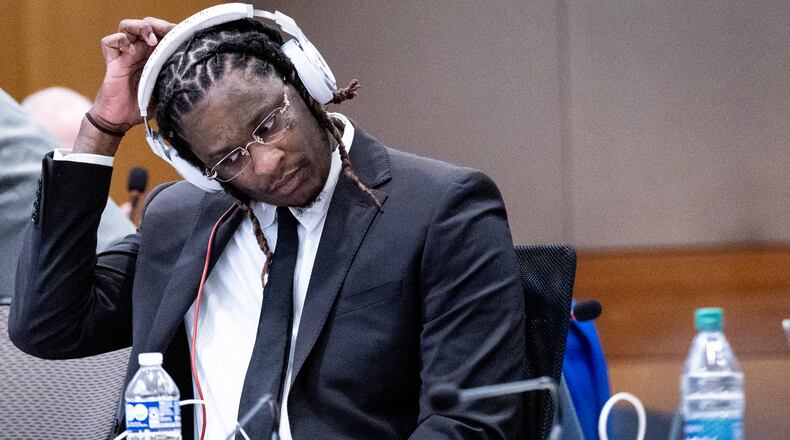Citing online threats made to witnesses in the high-profile gang and racketeering trial of Atlanta rapper Young Thug and others, prosecutors have asked the judge to prohibit members of the media from filming or photographing people testifying on the stand.
The Fulton County District Attorney’s Office said in a motion filed Friday that law enforcement officers and other witnesses called to testify in the lengthy trial have become victims of “online doxing” and “threatening communications.”
In a trial where rap lyrics are being introduced as evidence, a defense attorney for one of the defendants called the state’s effort to ban courtroom cameras the prosecution’s latest attack on the First Amendment.
Credit: TNS
Credit: TNS
Young Thug, whose real name is Jeffery Williams, is accused of being the co-founder and leader of “Young Slime Life,” which prosecutors say is a criminal street gang based in south Atlanta. The Grammy winning musician is currently standing trial along with five alleged accomplices. Court proceedings have been live-streamed since the start of trial, with thousands of fans and interested parties tuning in online each day.
According to the state’s filing, “menacing commentary” appeared in the live chat as a forensic analyst testified last month. The comment reportedly said “we will see u later” and included the witness’ name. That witness later received an “ominous” text message from an unknown number, prosecutors wrote.
As a result, law enforcement was sent to monitor the witness’ home.
“This is not the first time something like this has happened in this case,” District Attorney Fani Willis and lead prosecutor Adriane Love wrote in their motion. “In December 2022, an assistant district attorney who testified for the State at a video-recorded pretrial motions hearing fell victim to online doxing. This witness’ personal cell phone number was leaked to the uncharted wilds of the internet, and the threatening communications the witness thereafter received caused genuine fear for self and family.”
Another law enforcement witness had an incorrect home address posted in the chat while they testified, according to the state, prompting the DA’s office to send police to that location as a precaution.
Credit: Steve Schaefer
Credit: Steve Schaefer
Since opening statements were given Nov. 27, Judge Ural Glanville has asked journalists not to film or photograph certain law enforcement witnesses. The state’s latest motion, however, asks that he prohibit cameras from his courtroom altogether going forward.
“There is no constitutional or statutory right to videotaped trials,” the court filing said. “Witnesses’ fear for their physical safety and that of their families is only logical given the subject matter and circumstances surrounding this trial. This Court should take appropriate action before, rather than after, someone gets hurt.”
Defense attorney Doug Weinstein, who represents musician Deamonte Kendrick, called the state’s motion “a thinly veiled attempt to impugn the defendants in this case and hide the proceedings from the public.”
Credit: Steve Schaefer
Credit: Steve Schaefer
“The public should be able to view this case and the testimony of these witnesses and make their own assessment of what the State is doing,” said Weinstein, whose client performs under the stage name Yak Gotti. “Whether it be the defendants’ artistic expression or the freedom of the press, the State’s attacks on the First Amendment continue.”
The state contends that Glanville has every right to restrict the filming of witnesses if he finds there is “a substantial likelihood of harm” that outweighs the benefit of recording to the public.
Prosecutors say they’ve heard from potential witnesses who have raised concerns about their safety and that of their families should they choose to take the stand.
“If victims and witnesses are intimidated from testifying, the judicial proceedings are inherently compromised,” the state said in its filing. “In order to have a proper trial, witnesses must be willing and able to testify truthfully and without fear or favor.”
Credit: Miguel Martinez
Credit: Miguel Martinez
About the Author
The Latest
Featured






